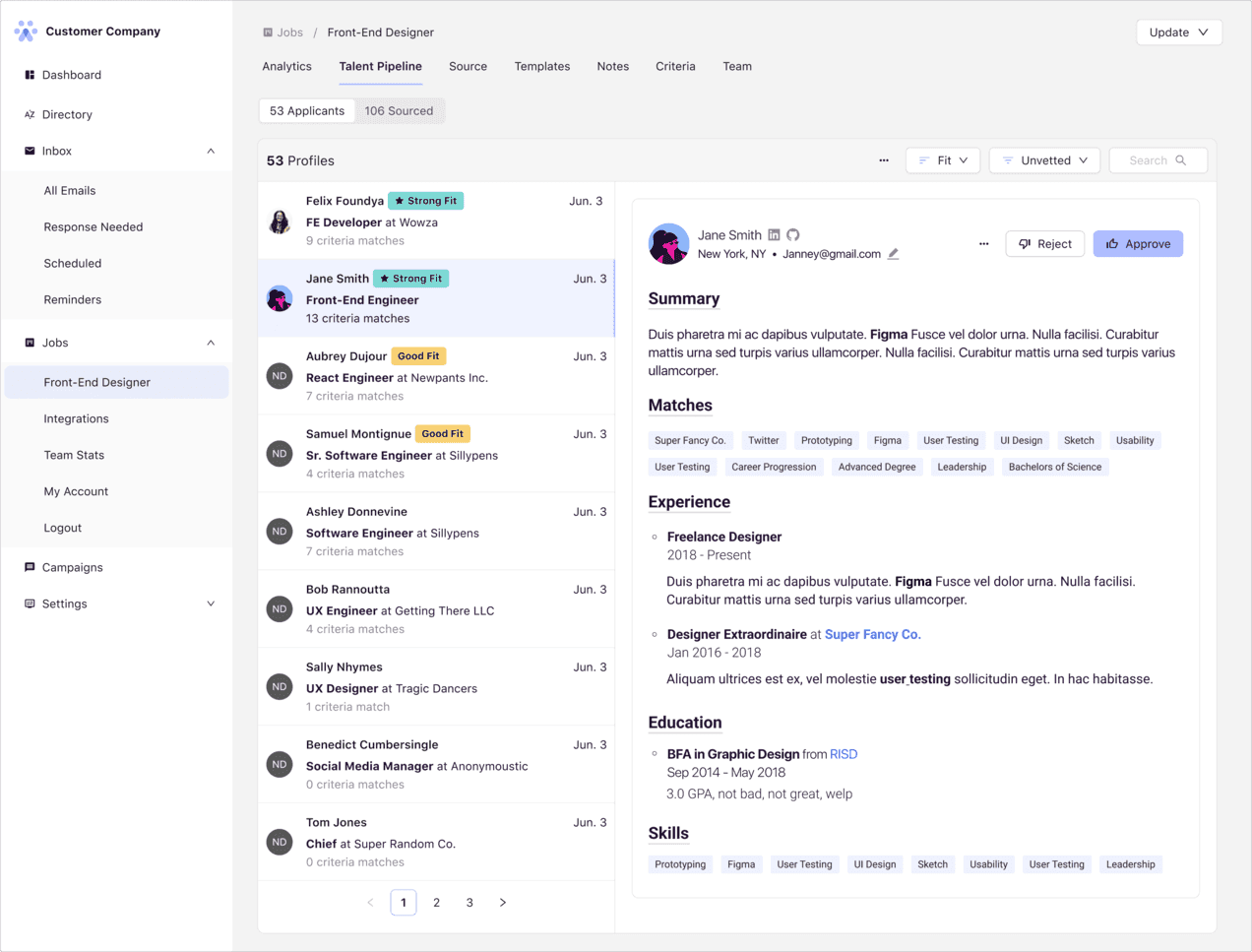AI adoption is picking up quickly. A report from McKinsey anticipates that over the next three years, 92% of companies plan to increase investment in AI, reflecting strong confidence in AI’s business potential. Over the past few years, we’ve all witnessed a rapid shift in how companies approach hiring. Technology has transformed the recruitment landscape in ways that, at times, feel both exciting and overwhelming.
And the recruitment world is no different. As a recruiter who specialises in placing personal and executive assistants, I’ve seen this transformation first-hand. Clients are fielding more applicants than ever before, and it’s only natural they’d turn to technology to help filter the noise.
At the same time, many of the best hiring decisions I’ve seen in my career have hinged on something you can’t always measure – chemistry, discretion, cultural fit.
That’s what I find most interesting about AI candidate screening: not just what it does well, but where it still needs a human touch. In this article, I’ll explore how AI is changing recruitment and why the future belongs to teams that embrace both tech and instinct.
TL;DR: AI Candidate Screening at a Glance
- AI helps streamline early-stage resume screening
- Great for high-volume hiring and time savings
- Still limited in detecting chemistry and cultural fit
- Best used alongside human recruiters—not instead of them
- Fetcher’s AI Candidate Review is a real-world example of this balance
What Is AI Candidate Screening?
Before deciding when to use AI in hiring, it helps to understand what it actually does and what it doesn’t do. This section covers the basics of how AI screens candidates.
AI candidate screening is the process of using artificial intelligence to review, assess and shortlist job applicants automatically. Rather than a recruiter manually reading through each CV, these systems analyse structured and unstructured data to determine which candidates are most likely to be a good fit.
That might sound simple on the surface, but the technology has become increasingly sophisticated. Some tools rely on keyword and skill matching, while others apply natural language processing to evaluate how a candidate communicates. In certain cases, machine learning algorithms can even predict performance based on patterns in past hiring data.
"From my perspective as a recruiter... The best hiring decisions often come down to factors that aren’t on a resume."
For companies overwhelmed by application volume, this kind of automation can be transformative. AI screening makes it possible to review hundreds or thousands of applicants quickly and consistently. No fatigue, no distractions, no biases – at least in theory.
At Fetcher, for example, AI powers both their outbound sourcing and their inbound candidate review. Their AI candidate screening feature uses automation to prioritise inbound applicants and bring the most relevant profiles to the top, saving time without sacrificing quality.
From my perspective as a recruiter, I can see how useful this can be, especially in early-stage screening for high-volume roles. But it also raises an important question: can a machine really tell who’s right for a role, or does it just know who ticks the boxes? That’s where the human side of hiring still plays a critical role.
Fetcher explores this in more detail in Exploring AI’s Impact on Recruitment.
'
Why Employers Are Embracing AI Screening
High Application Volumes Require Smarter Filtering
In a world where the average job posting can attract hundreds of applications – sometimes thousands – it’s no surprise that employers are looking for smarter, faster ways to manage the influx. AI candidate screening has emerged as one of the most promising tools to help teams keep up.
The scale of adoption is growing. Just recently, Reuters reported that Capita plans to deploy AI recruitment tech across its hiring operations by summer 2025. While in the early days of AI adoption, AI might not have been a match for human efficacy, today’s models are near the intelligence level of people who hold advanced degrees.
AI Delivers Speed and Scalability
For many hiring managers, the appeal starts with efficiency. AI can scan and sort through applications far faster than a human ever could, flagging top candidates in a matter of minutes. That’s a major advantage when speed is critical or when resources are stretched thin.
Consistency and Fairer Evaluation
There’s also consistency. Unlike people, AI doesn’t get tired or distracted. It applies the same criteria across the board, which can help ensure that every applicant is evaluated fairly, especially when reviewing large volumes of inbound CVs.
Reducing Bias Through Data-Driven Screening
Some companies also see AI as a way to help reduce unconscious bias, provided the system is designed responsibly. By focusing on skills, experience and structured data, AI can sometimes surface candidates who might otherwise be overlooked.
The Human Factor Still Matters
I can appreciate these advantages, particularly for businesses hiring at scale. But efficiency and fairness are only one side of the story. As someone who recruits for roles where trust, personality, and chemistry matter just as much as credentials, I’ve learned that checking boxes isn’t the same as choosing the right person.
Fetcher shares how leading teams use AI to identify talent efficiently.
How AI Candidate Screening Works (and Varies)
Not all AI screening tools are built the same. Some rely on fairly simple logic: scanning for keywords or phrases that match the job description. Others are far more advanced, using machine learning to analyse the structure and context of a CV, assess writing tone or even predict how well a candidate might perform in a particular role.
Common AI Screening Techniques
- Keyword-based filters: These tools look for specific terms tied to qualifications or skills. They're fast, but easy to manipulate, and can miss great candidates who phrase things differently.
- Natural Language Processing (NLP): NLP can interpret language more like a human would. It looks at meaning, context, and phrasing to create a fuller picture of the candidate.
- Predictive algorithms: These tools use historical hiring data to rank or score applicants based on their likelihood to succeed.
- Interview analysis tools: Some systems assess video or voice responses to evaluate communication, confidence, or soft skills.
As these tools continue to evolve, the gap between basic automation and true AI is widening. For employers, that means it’s worth understanding what kind of screening your tools are really doing, because not all “AI” is equally intelligent.

Where AI Still Needs Backup
As impressive as AI candidate screening tools have become, there are certain things they still struggle to grasp, and I’m not convinced they ever fully will. In my experience, some of the most successful placements come down to something you won’t find in a CV or a data model: chemistry.
At Oriel Partners , we recruit personal and executive assistants – roles where discretion, emotional intelligence, and personality fit are absolutely critical. Yes, a candidate’s background and skill set matter. But also how they communicate, anticipate needs, and adapt to different work environments.
As we've explored in this piece on what top executives value in a great PA, it’s often those intangible qualities – from emotional intelligence to trustworthiness – that determine a placement's long-term success.
These nuances don’t always show up in a resume, and even the most advanced AI can’t reliably detect them, yet. That’s why I believe that AI works best when it’s paired with human insight and not used in isolation. Screening tools can help us filter out noise and identify strong options quickly.
But when it comes to assessing values alignment, subtle cues, or long-term compatibility, we still need a person – ideally one who understands both the client and the candidate – to make that judgment. This is why so many recruiters continue to emphasise the importance of human skills in the age of AI
So, is AI useful? Absolutely. But can it fully replace human recruiters, especially for sensitive or high-trust roles? Not in my view. The future of hiring isn’t human or AI. It’s human + AI, working together to make smarter, faster and more empathetic decisions.
This is also why we’re often brought in to work alongside internal recruitment teams. When time is tight or the brief is particularly sensitive, our role is to take that pressure off, providing thoughtful, fully vetted candidates with a strong cultural fit. We complement in-house recruiters when nuance and trust are key.

Spotlight on Fetcher’s AI Candidate Review
While our team at Oriel doesn’t use AI tools in our own recruitment process, I can absolutely see the value they bring to in-house teams managing high volumes or lean resources. Fetcher’s AI candidate sourcing is a great example of how AI can streamline the early stages – prioritising top-fit candidates quickly, and helping hiring teams focus on real engagement rather than admin.
Instead of spending hours combing through resumes manually, AI candidate sourcing automatically prioritises the most relevant profiles based on the job criteria.
It uses AI to assess candidate fit and brings the strongest applicants to the top of the list, so you’re not starting from scratch every time you open your inbox. Unlike basic keyword-matching tools, AI Candidate Review learns from real hiring patterns, offering a smarter, more nuanced shortlist that evolves with each role.
What I like about this approach is that it doesn’t try to take over the whole process. It gives you a starting point, allowing you to focus your energy on reviewing and interviewing the right people, not wading through a sea of CVs.
If you’re curious, I recommend reading more about it in Fetcher’s product update. It’s a great example of how thoughtful technology can make hiring more efficient, without losing sight of the human element.
What Job Seekers Should Know About AI Screening
While this article is primarily written for employers and hiring teams, I’d be remiss not to speak to candidates too, especially those wondering how AI might be affecting their job prospects.
The truth is, if you’ve applied for a role online in the last couple of years, there’s a good chance your CV has already passed through some form of AI screening. That doesn’t mean you need to start writing your application like a robot, but it does mean clarity and structure matter more than ever.
Quick Tips for Getting Through AI Screens
Here’s how to make sure your application gets noticed—by both algorithms and people:
- Use a clean, simple resume format
- Mirror language from the job description (but don’t overdo it)
- Use standard section headings like “Work Experience” and “Skills”
- Avoid graphics, text boxes, and PDFs with complex layouts
Many AI systems still struggle to interpret imagery and complex design layouts. That said, don’t try to “game the system.” Authenticity still counts, especially once you make it through to a human reviewer. AI might help surface your profile, but it’s your experience, personality and communication style that will ultimately land the role.
From where I stand, the best approach is simple: write with both algorithms and people in mind—because in most modern hiring processes, you’ll need to appeal to both.
So, Is AI Candidate Screening the Future?
In many ways, yes. AI screening is already part of the future. According to the, World Economic Forum 88% of companies already use some form of AI for initial candidate screening.
The technology is here, it’s improving rapidly, and it solves real problems for stretched hiring teams. It’s helping employers move faster, make fairer decisions at scale and spend more time engaging with the right candidates.
And the data backs this up. Accenture reports that 93% of executives are seeing gen AI investments outperforming other strategic investments.
But is it the whole future? I don’t think so.
What AI doesn’t do, at least not well, is understand context, emotional nuance or personal dynamics. And that’s where hiring gets interesting. Whether it’s a PA who needs to be two steps ahead of their executive or an office manager who’s the cultural glue of the team, success isn’t something you can fully quantify. It’s something you sense.
For more insights on AI in recruiting, visit the Fetcher blog.
That’s why I believe the strongest hiring strategies will combine AI’s strengths with human expertise. Use the tools to streamline the process—yes—but trust your instincts, your conversations and your experience when it comes to making the final decision.
This is especially true for roles where trust, loyalty, and emotional intelligence matter as much as qualifications. That includes not only executive assistants and PAs, but also client-facing administrators, team coordinators, and office managers—roles that shape a company’s internal culture every day.
AI Candidate Screening Is Already Reshaping Recruitment
Used well, AI can be a powerful ally. But while automation can speed things up and surface promising profiles, the most successful hires still come down to something only humans can judge: connection, chemistry and cultural fit.
As a recruiter, I welcome the efficiencies AI brings, especially when they free up time for meaningful decision-making. Whether it’s a tool like Fetcher enhancing the early stages or a specialist agency stepping in for more nuanced roles, the future of hiring will belong to teams who know when to rely on tech and when to trust their instincts. That, to me, is the kind of recruitment I’m proud to be part of.
If you’re curious how this works in practice, Bevi’s story is a great example of Fetcher in action.
About the author
Auria Heanley is co-founder of Oriel Partners, a business support and PA recruitment agency based in Central London. She is extremely passionate about providing the highest quality of service to both clients and candidates, for both permanent and temporary staffing. Her experience recruiting for high-trust roles gives her a unique lens on where AI adds value—and where human judgment still leads.
Oriel Partners’ clients range from global multinationals to small boutique firms, all requiring the same personal service and high-calibre support. Oriel Partners often works in partnership with in-house recruitment teams, providing specialist support when roles require deep insight, speed or sensitivity.
About Fetcher
Our mission is to help you engage talent that will transform your business aspirations into reality. Great talent is hard to find—that’s why we offer a talent sourcing platform that not only gets your brand in front of the right candidates but also gives you a competitive edge in talent acquisition.
Begin building a relationship with your next great hire today and let Fetcher handle the rest. Learn more.




